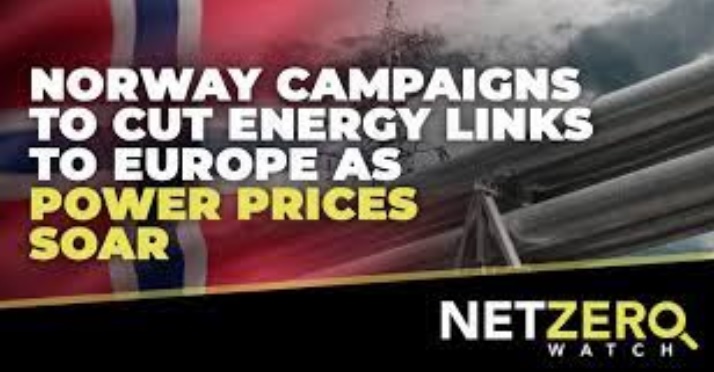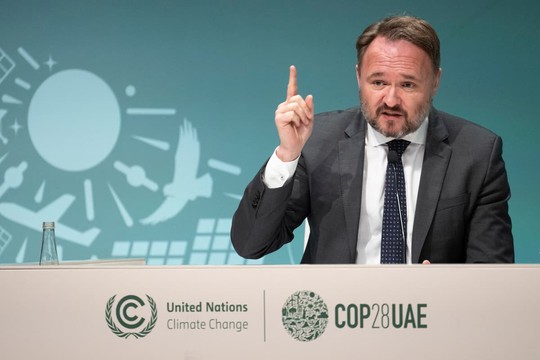The EU’s new energy chief Dan Jørgensen.
Photo: ‘The Local Denmark’
Dan Jørgensen is making it his “main priority” to craft a plan that will finally sever all European Union energy links with Russia, POLITICO notes.
In his first interview since taking office as the EU’s new energy chief, Jørgensen warned that the EU is faltering in its multiyear campaign to shun Russian fuel and needed a plan to get things back on track.
He pointed to the EU’s rising purchases of Russian liquified natural gas as a particular concern — and a reverse of the bloc’s downward trajectory. Additionally, five EU countries still rely on Russia for nuclear fuel.
“To have been able to bring down our dependency to such an extent that we have is actually quite an accomplishment,” Jørgensen said, speaking from his largely as-yet-unfurnished office in the European Commission’s Berlaymont headquarters.
But “it’s obvious to everybody that something new needs to happen because… now it's beginning to go in the wrong direction,” he added, saying he would roll out “a tangible roadmap that will include efficient tools and means for us to solve the remaining part of the problem.”
Jørgensen said his plan will focus “on gas primarily, but also oil and nuclear,” and will land within the first 100 days of his taking office, effectively giving himself a mid-March deadline.
The bloc has already imposed a blanket ban on Moscow’s seaborne coal and oil exports while slashing its dependence on pipeline gas supplies by roughly two-thirds.
But the efforts have plateaued in recent months. In 2024, the EU is even expected to import roughly 10 percent more LNG from Russia than in 2023, according to the commodities platform Kpler.
Efforts to tackle these remaining links won’t be easy.
Jørgensen pointed to his experience as Denmark’s climate minister in 2022 when he attended eight emergency summits of EU energy ministers as the bloc faced a sweeping gas price crisis.
He will also have significant political support behind his push. Just this week, 10 EU capitals jointly called for sanctions on Moscow’s nuclear and LNG sectors.
Jørgensen’s proposal will also likely land weeks after the end of a long-term gas transit agreement that allows mostly Central European countries to continue importing Russian pipeline gas via Ukraine. While several countries are discussing potential workarounds to keep the gas flowing, Jørgensen said he expects the deal to expire.
LNG imports will be “certainly one of the first things we have to discuss” with the incoming U.S. administration, Jørgensen said.
“We need to be mindful that we could not have done the decrease in dependency from Russia without energy from… the U.S,” Jørgensen said. “They really have been our friends and I hope, of course, that we will continue to be friends.”
…A very interesting decision. It seems like shooting yourself in the foot because Europe is already talking loudly about energy poverty. Will expensive LNG from the US really reduce poverty for European citizens?
Energy poverty is emerging as an issue in the European Union. Amid rising energy prices, security concerns, and the transition to climate neutrality, developing tailored energy policies is a critical priority, ‘Euractiv’ reveals.
The European Commission defines energy poverty as when a household must reduce its energy consumption to a degree that negatively impacts the inhabitants’ health and well-being.
It is driven by high costs, low income, and inefficient housing. The issue, linked to public health, social equity, and climate vulnerability, disproportionately impacts the most fragile communities.
Between 8 and 16 per cent of the EU population now faces energy poverty.
The yearly percentage of Europeans who could not keep their homes adequately warm in winter has increased. While in 2021, it stood at 6.9 per cent, it reached 10.6 per cent in 2023, according to Eurostat.
In Greece and Bulgaria, nearly 30 per cent of the population is energy-poor, while in the Western and Northern EU countries, the figure drops below 5 per cent, according to Commission data.
A study published by GESIS emphasises the need to tackle energy poverty through a combination of long-term and short-term measures.
In the short term, governments should implement income-based support measures, particularly for vulnerable households in regions with extreme weather conditions like Southeast and Eastern Europe.
While the green transition offers long-term financial savings through energy-efficient technologies, low-income households – those most in need of such savings – often lack the capital or credit access to afford these investments, exacerbating inequality.
Meanwhile, high-income households dominate the early adoption of green technologies, increasing energy demand and infrastructure strain. That is why delivering a fair household energy transition is essential for Europe.

Norway’s two governing parties want to scrap an electricity interconnector to Denmark, with the junior coalition partner also calling for a renegotiation of power links to the UK and Germany, as sky-high prices trigger panic in the rich Nordic country.
A lack of wind in Germany and the North Sea will push electricity prices in southern Norway to NKr13.16 ($1.18) per kilowatt hour on Thursday afternoon, their highest level since 2009 and almost 20 times their level just last week, ‘The Financial Times’ reports.
“It’s an absolutely shit situation,” said Norway’s energy minister Terje Aasland.The ruling centre-left Labour party now says it wants to campaign in next year’s parliamentary election, set for September, to turn off electricity interconnectors to Denmark when they come up for renewal in 2026.Its junior coalition partner, the Centre party, has long demanded an end to the Danish connection and also wants to renegotiate existing interconnectors with the UK and Germany.
The issue is also causing deep alarm among EU countries keen to use Norway’s abundant hydroelectric power to help balance energy prices on the continent.
“This is a crunch moment for EU-Norway relations. Reducing power connections to Europe will not be well received,” one EU ambassador in Oslo said.
EU countries believe it is important to have an integrated electricity market and underscore that Norway also imports power using the interconnectors when it needs to.
Norway is also western Europe’s largest petroleum producer and has replaced Russia for many EU countries as their biggest supplier of gas.
But sharp increases in electricity prices in Norway in recent winters have led to a political storm, ensuring that the issue of power interconnectors is likely to be one of the main topics in next year’s elections.
…An interesting formula for Europe: Russophobia = cold and energy poverty.
read more in our Telegram-channel https://t.me/The_International_Affairs

 10:00 14.12.2024 •
10:00 14.12.2024 •























